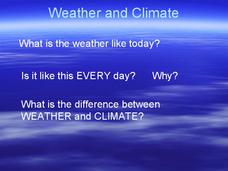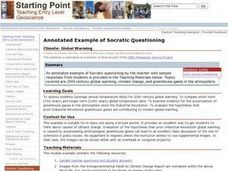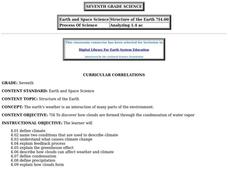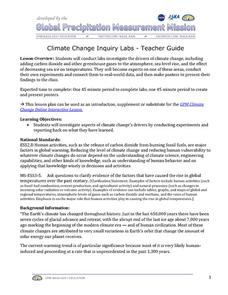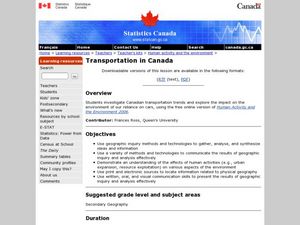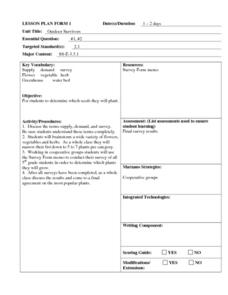Curated OER
Weather and Climate
It's hot today, but is that the weather or the climate? This colorful presentation isolates both concepts to allow for better understanding by covering the positioning of the planet, making comparisons of land versus water, and looking...
American Museum of Natural History
What do you Know About Climate Change?
Test the class's knowledge of the key components of climate change. A 10-question online quiz asks learners about weather, climate, greenhouse gases, and several other concepts related to climate change. Interactive and easy for...
Curated OER
Annotated Example of Socratic Questioning: Climate: Global Warming
Students compare and discuss short-term and longer-term global temperature data. They evaluate data from three sets of graphs and then participate in a structured whole class Socratic discussion on the possible causes of climate change.
Curated OER
Climate change in Canada
Students investigate the impact of human activity on the environment. In this secondary math/science lesson plan, students analyze and interpret information from data and graphs as they investigate trends in climate change and the...
PHET
Planet Designer: Kelvin Climb
It's time to get those creative juices flowing! This second lesson in a series of five continues allowing pupils to design their own planets. It the same format as the first, but, this time, allows learners to alter greenhouse gases to...
Curated OER
Structure of the Earth
Seventh graders study the cause of climate change, and how clouds form and affect weather. They define condensation and precipitation, the greenhouse effect and the water cycle.
Curated OER
Topics in Environmental Science
Students discover topics in environmental science. In this science lesson plan, students build a model to simulate the greenhouse effect and analyze and interpret data, especially the results of introducing pollutants into nature.
Curated OER
Human Activity and the Environment
Students review and analyze graphs and tables as a group. They develop their graph and data analysis skills by converting data tables from Human Activity and the Environment into graphs.
Curated OER
Writing about the climate
Learners research the contributing factors to the Earth's paleoclimate. They determine the relevant climate data and use it to construct a science argument. In the process, they access data, capture images of the data plots, and...
Chicago Botanic Garden
Personal Choices and the Planet
The last activity in the series of four has individuals determine steps they can take to reduce their carbon footprints and then analyze their schools' recycling programs. Through a sustainability audit, they identify how and where their...
NASA
Climate Change Inquiry Lab
With global temperatures on the rise faster than ever recorded, the effects of a heating planet could be devastating. Allow learners to discover just what the world is in store for if the warming continues through a series of videos, a...
Chicago Botanic Garden
Calculating Your Carbon Footprint
Unplugging from technology for one day per week will decrease your carbon footprint—are you up to the challenge? Part two in a series of three allows individuals to explore their personal carbon footprints. By first taking a quiz at home...
Curated OER
Diurnal Temperature Changes and Water Vapor Content
Pupils determine how much moisture in the air affects the diurnal temperature range. They investigate to determine the different climatological regimes of both the Southern Plains and the world. and greenhouse gases effect the earth's...
Curated OER
Dimming the Sun
Pupils collect, interpret and analyze weather variable data. They describe atmospheric variables that affect evaporation. Students create graphs and analyze the information collected.
Curated OER
Transportation in Canada
Students investigate the effect human activities have on the environment. In this geography instructional activity, students compose an article using data analysis about the environment. This article requires some homework assignment.
Curated OER
Mission Planning: Earth/Mars Comparisons
Students compare and contrast conditions on Mars to those on our own planet, specifically, their local or regional environments. The physical characteristics, the atmosphere, and other astronomical data is considered.
Curated OER
The Kyoto Protocol: What Should We Do?
Students examine why the United States did not ratify the Kyoto Protocol. They develop their own opinion on the Protocol and share them with the class. They also discover how scientific data may be organized to use in a debate.
Curated OER
Acid Rain Keeps Falling on My Head
Students examine the pH level of rain water in their local community. They locate each location on a map. They analyze the data and draw conclusions.
Curated OER
Using Mathematic Models to Investigate Planitary Habitablity
Students examine how the sun's intensity affects the temperature on various planets. They determine whether or not these planets could be habitable. Finally, they factor in the average albedo of the planets to determine whether or not...
Curated OER
Outdoor Survivors
Fifth graders complete a survey to decide what are most popular plants among the class. They test the water quality in a nearby pond. Studnts test the quality of soil samples taken from their homes. Different plants are moistened with...
PHET
Planet Designer: Retro Planet Red
What does the atmosphere on Mars look like? This fourth instructional activity in the series of five is designed for high schoolers. Scholars apply previous knowledge to add atmosphere to Mars in an online simulation. This comprehensive...
PHET
Planet Designer: Martian Makeover
Mars used to have liquid water, can you make it come back? Use the instructional activity and simulation to understand why Mars lost its magnetic field, why atmosphere is important, and what gravity has to do with it. This is the third...
Teach Engineering
Efficiency of a Water Heating System
Tired of waiting for hot water? Groups of three determine the efficiency of an electric water-heating device. They calculate the amount of energy it takes to heat the water and the theoretical amount of energy required to heat the water....
Teach Engineering
Efficiency of an Electromechanical System
How efficient is a motor in a LEGO set? Future engineers conduct an activity where a LEGO motor-generator system raises an object to a specified height. They then show what they learned and use their measurements to calculate the energy...


